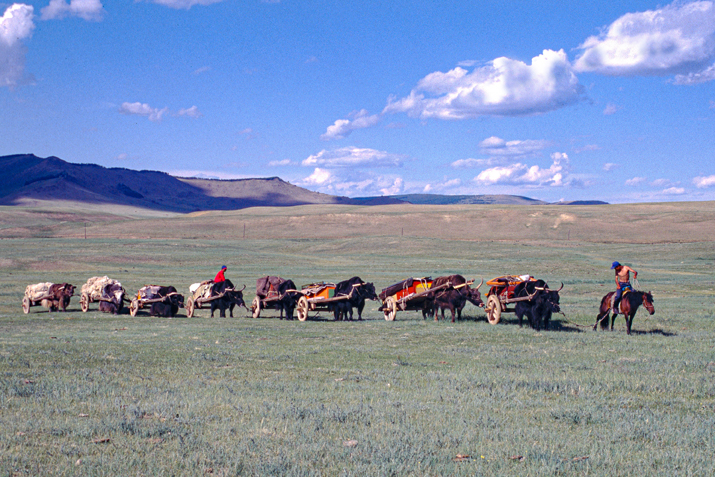
Preparation marathon and exotic TV appearance
N 49°38'671'' E 100°11'496''
Day: 80-81
Sunrise:
07:35/07:36
Sunset:
18:36/18:34
Total kilometers:
777
Soil condition:
Dust/gravel
Temperature – Day (maximum):
16°C
Temperature – day (minimum):
10°C
Temperature – Night:
minus 3°
Latitude:
49°38’671”
Longitude:
100°11’496”
Maximum height:
1220 m above sea level
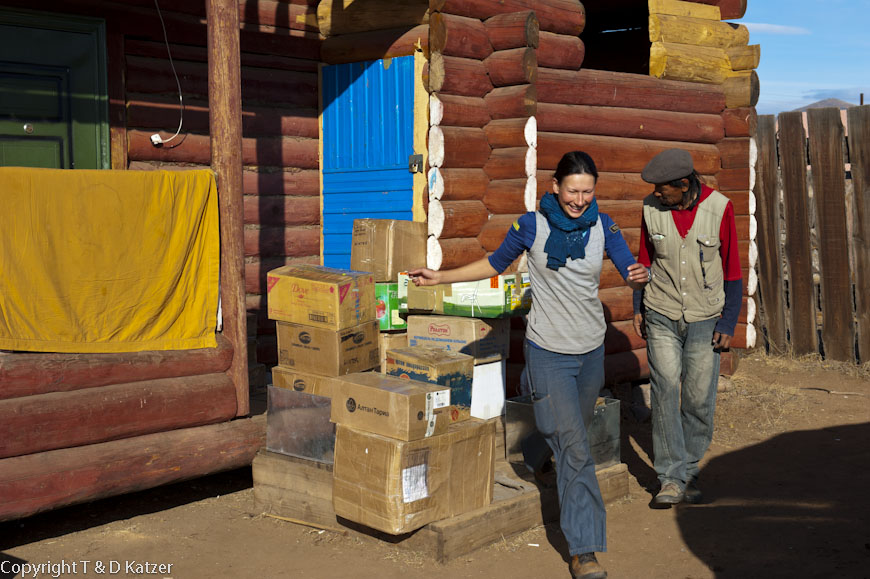
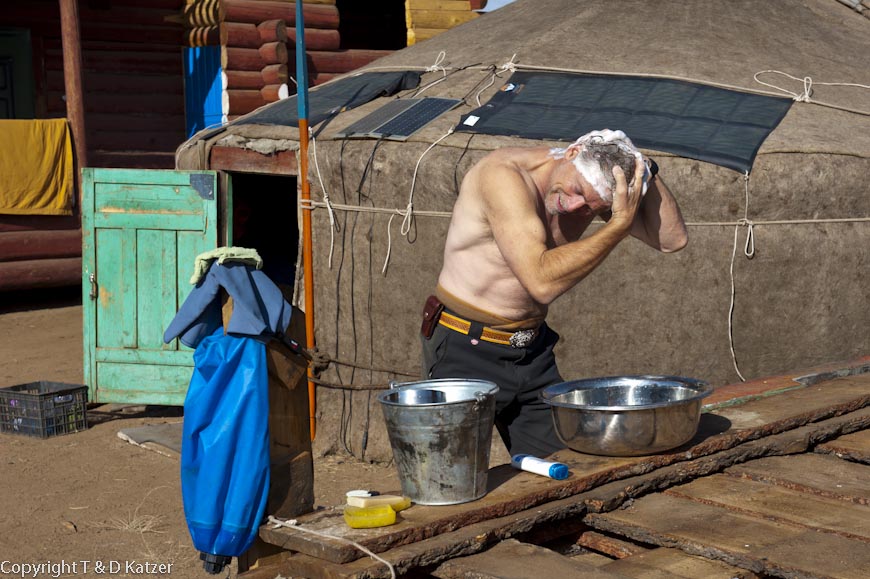

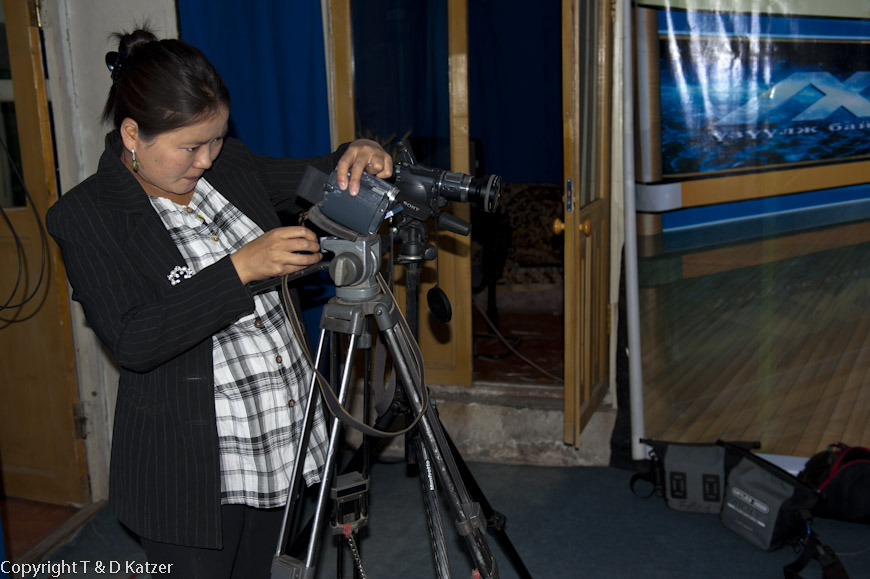
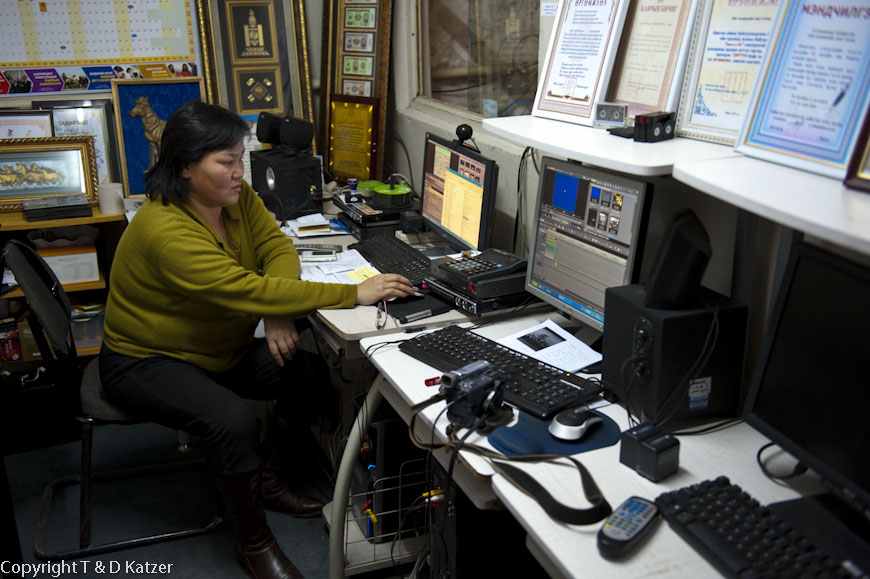
For the past two weeks, Tanja has been going to the supermarkets in the small town every day and buying food by the carton. Unfortunately, Mongolia is not like Germany, where we can get everything our hearts desire in the supermarkets. The stores here are now better stocked than they were a few years ago, but many products are simply out of stock. So it is real work to put together a proper food supply for ¾ of a year without missing anything. In our yurt, we can hardly move because of the piles of neatly packed cardboard boxes. So this morning Tanja and Bilgee put about 20 of them in Saraas shed, which we are allowed to use as temporary storage for our equipment and food. Then we prepare delicious pancakes. Bilgee then rides out of town as usual to look after the horses while I set off to do some shopping at the market as I had decided yesterday. Before I take care of the wooden table and chairs, I get another car battery. Because of the coming heavy frost, it makes sense to have our energy supply secured. I have been told that car batteries can also freeze through from minus 15 degrees and thus give up the ghost. I don’t know if that’s true, but better safe than sorry. Then I buy a 2.50 wide, 2 meter long and one centimeter thick felt blanket as a base for our yurt sleeping area. I discover the matching fabric into which, according to Saraa, the felt blanket has to be sewn. In a tool store I buy a few boxes of screws and nails in various sizes. After some searching, I find the only small store in town that only sells candles and incense for monasteries. As Tanja has bought all the candles from the supermarkets in town, this store is a gift. I have a total of 300 of them packed. Although they were cast in China, the seller promises their good quality and long burning time. We should therefore have enough light for a long winter in the taiga. At the end of the day at the market, I get a sturdy wooden table and two real wooden chairs that will certainly serve us well.
Exotic television appearance
As soon as I get back to the yurt, I get ready for our first Mongolian TV appearance. Although I only had a fresh shower yesterday and dressed in a washed shirt and trousers, I’m already dusty again today. So I treat myself to another scoop shower in Sara’s courtyard and put on a fresh shirt. Then I grab my camera equipment and tripod and rush out onto the dusty track because I’m running late. Since Mörön is laid out on the drawing board according to the communist model, there is a kind of intersection every few hundred meters, which is located on a huge square. I wave when a car drives past. In the country’s small towns and villages, all cars are authorized to function as cabs. You only need to signal with your hand when a car passes by. The driver usually stops and gives you a lift. This means that anyone sitting behind the wheel can earn a little extra money. For some, it is even the main source of income. One kilometer usually costs 600 Tugrik (0.34 €). Most of the time it works perfectly, but right now no car wants to show up. I’m supposed to be at the station in 10 minutes. Finally one of the ancient crates comes coughing past. The driver opens the passenger door as it is often not possible to open it from the outside. I show him my note with the address and off we go. Barely two kilometers further on, the engine starts to pant badly. With the last twitch of the engine, we roll into the service station. Although I have used such transportation countless times now, this is happening today. The driver fills up for 7,000 Tugrik (€4), then jets on over the potholes. Since the mayor’s secretary organized the TV appearance, I call her on her cell phone to announce that I will be late. “No problem. We’ll wait for you,” she reassures me. Then the driver stops next to a dilapidated building. “And that’s the city’s TV station?” I ask. He nods his head weightily and darts off. Of course it’s not the channel. A couple of teenagers send me to the other side of the road. There I come across the same broken-down block of houses. Undrakh stands in front of it and welcomes me with a smile. I follow her into the basement through a dingy corridor at the end of which you would never look for a transmitter but rather an old potato cellar. We step through a door and enter the recording room. Two old neo-tubes stand upright on the left and right in front of a glass table on which a microphone is waiting to be used. Behind it is a blue plastic tarpaulin with our planet visible on the right-hand side. On the other side of the room, another film hangs from the ceiling, giving the viewer a three-dimensional impression of a news studio. I am greeted in a reserved and friendly manner by the pregnant presenter. Tanja arrived before me. She was shopping nearby in one of the supermarkets. Then the young woman places a hand-sized Handycamcorder on an old tripod. We are asked to take a seat. Undrakh acts as translator and sits to the right of the presenter. Then I arrive and to my left is Tanja. We have a brief chat with Undrakh about what we want to talk about in the 30-minute show. Tanja and I have given hundreds of TV interviews over the last 20 years. Some on major public broadcasters, many on national and regional private broadcasters and some abroad. This one is something special. Everything seems somehow surreal and yet the operators of the TV station manage to keep a 24-hour channel alive with relatively little effort. When the show starts, the boss of the store is standing behind the small Handycam next to which I have placed our video camera on our tripod to record the show. Compared to the equipment here, ours is certainly high-tech and useless compared to a transmitter in Germany. We talk about our journey, our life project, our impression of Mongolia today and how it compares to our horse expedition 15 years ago in this country. We also report that we are campaigning for new windows for the local prison and want to promote tourism in the region through our reports. We would like to thank the local people for their hospitality and often unexpected willingness to help, not forgetting to mention that Mongolia is undoubtedly one of the most beautiful countries on our Mother Earth. “Protect your land. Guard it like a precious jewel and make sure that the local mining companies do not destroy it forever and ever. Protect the most precious thing we humans have. Mother Earth. So that your children can still see trees and hear birds chirping tomorrow,” we say at the end of the long interview.
When we return to our Mongolian home in the evening to cook our meal, Saraa calls us. “Tanja! Denis! Come quickly! Your interview is on TV!” We immediately put the pot down from the cannon stove and hurry into Saraa’s log cabin. We are surprised at how well the small TV station organized the interview. The professional-sounding Mongolian translation now hangs over our voices. Images from our books and brochures are also shown. “That was a very nice interview. Thank you very much. When you go to the market tomorrow, I’m sure you’ll be approached more often,” says Saraa.
We look forward to your comments!

